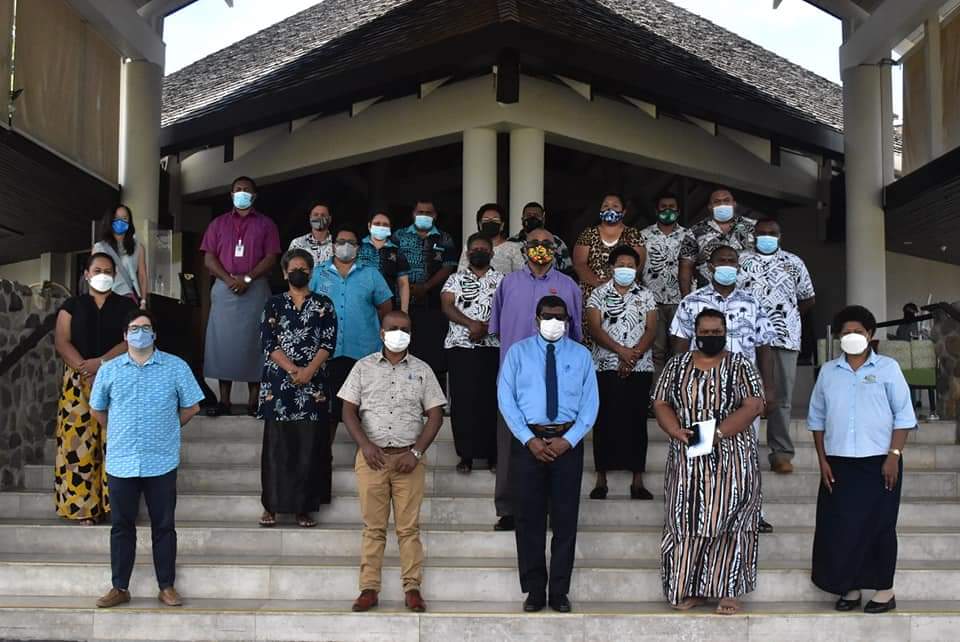SUPPORT OF INTERNATIONAL COMMUNITY VITAL IN MAINTAINING FIJI'S NATIONAL FOOD SYSTEMS
November 3, 2021

The support of the international
community has been identified as a vital component in transforming Fiji’s food
systems.
This was stressed by Minister
for Agriculture, Waterways and Environment Hon. Dr. Mahendra Reddy when opening
the 2-day Fiji Food System Dialogues Validation Workshop at Radisson Blu on
Denarau, Nadi.
Hon. Reddy highlighted the
country-specific binding constraints that curtailed the sustainable development
of agriculture and food systems in Fiji, elaborating the required contributions
needed from developed participating members of the Global Food Summit.
He singled out the lack of farm
mechanization as a glaring indicator of the country’s incipient agricultural
development model, an aspect which needed urgent action from international
parties to help progress farming practices towards fully mechanized farming
models.
"The whole idea of
undertaking country-wise food system conventions is to come up with the
country-specific binding constraints and the solutions to it, as this is
something that you may not find in other countries and this is why we need to
ease out on some of these country-specific binding constraints."
“The reason behind coordinating
and organising global food summits is to reach an agreement on how we mobilize
resources on a global level and pass it onto the country level so that we can
address some of the issues at the country level,” said Hon. Reddy.
“What we need from the global
food summit is assistance in developing our mechanization. Otherwise, it's no
use having a global food summit if the global players are not willing to
allocate resources to deal with these binding constraints and this is where we
need it because our rate of mechanization is very slow and that is affecting
agricultural growth and we now need to move towards rapid mechanization for
sustainable food systems,” he added.
He explained that to better
understand farming and food systems, it required identifying these constraints
to enable bold new transformative actions while delivering on all 17
Sustainable Development Goals (SDGs), each of which relied, to some degree on
healthier, more sustainable and equitable food systems.
“If this is not achieved, then
all this consultation and planning will just be an agenda item ticked.
“We can have the best plan and
strategy but if we don’t provide resources to implement those plans, then its
time wasted.
“It is now more than ever, that
Fiji needs to protect its food system, especially towards post-COVID-19. We
urgently need multi-sectoral collaborations to address short-term plans and
long-term implications of the interruptions to our food system, caused by the
pandemic,” he said.
Binding constraints such as a
lack of long-term lease agreements, minimal amounts of available land for
agriculture, non-availability of Mataqali land for commercial agriculture use
by Mataqali members, slow rate of mechanization, limited finance resourcing for
agricultural ventures, and a lack of market opportunities in remote areas were
identified.
Additionally, farm access roads
and food processing plants are also viewed as areas that need to be addressed.
Another binding constraint
stated was the use of Phytosanitary measures to restrict exports, as it
continued to be a barrier that prevented the free movement of fresh produce to
international markets.
The forum will revise approaches
needed to unlocking the full potential of Fiji’s food systems and discuss
transformational pathways aimed at describing Fiji’s current food system, and
identify binding constraints in order to develop pathways that will enable a
safe and sustainable food system that considers key actions, such as promotion
of; sustainable livelihoods, preservation of essential forest ecosystems and
native biodiversity, and provide food and nutrition security that will ensure
the economic growth for a better and secure future for all Fijians.
An expected outcome of the 2-day
workshop is a validated and finalized Fiji Food System Pathway Document which
sets the precedent towards “A Safe, Resilient, & Innovative Food System”.
The forum ends today.
-Ends-
